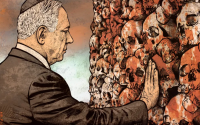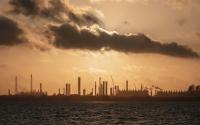19 December 2005Gretchen Gordon
This past Sunday, the people of Bolivia elected indigenous leader Evo Morales as their next president. In elections that have captured international attention, Morales' Movement Toward Socialism (MAS) won over 50 percent of the popular vote, with a 20 percent lead over conservative opponent Jorge Quiroga. MAS' win represents a significant increase over pre-election polls, which placed Morales at a maximum of 30-34 percent, and within a few points of Quiroga. The surprisingly large victory achieved by Morales at the polls, however, belies the great challenge ahead for a MAS government when it actually takes power next year.
Last week, in a packed soccer stadium in Cochabamba, Bolivia, Marcello Guzman carried a large billowing multicolored checkered indigenous flag against a strong wind. Among 60,000 fellow Bolivians, Guzman stood beneath a darkening sky, holding out despite an impending thunderstorm for the chance to cheer on Morales in his final campaign rally before elections.
Guzman describes himself as a member of Bolivia's two largest indigenous groups, a "Quechua and Aymaran brother of Evo," and his proud sentiment represents the intense feeling of expectation alive in Bolivia as it stands poised to usher in South America's first indigenous president. "Evo! Evo!
Evo!" chants the crowd as Morales's hoarse voice implores the audience to be part of "the struggle for the liberation of the people of Bolivia."
"We're very close to recovering the land and all the natural resources... to nationalizing all of the natural resources," shouts Evo. "The natural resources can't be given away, can't be privatized, they belong in the hands of the Bolivian state!"
After centuries of rule by criollos, often foreign-educated upper class, Bolivia remains the poorest country in South America despite a rich supply of natural gas and other resources. The prospect of Morales' Movement Toward Socialism (MAS) party taking power has had many in Bolivia, the region, and beyond watching attentively the unfolding events in this small, often overlooked, country. As Morales tells the crowd, the change currently taking place in Bolivia "is not only the hope of Bolivia but the hope of Latin America."
In the last three years, exacerbated by free-market or "neo-liberal"
reforms, Bolivia's historic disparity of wealth and power has come to a boiling point. Bolivians have repeatedly taken to the streets, and amid violent clashes with security forces, two successive governments have prematurely resigned. Among the critical issues in play are who will control the country's rich natural gas reserves, and whether or not Bolivia's disenfranchised indigenous majority will finally have a share in the nation's wealth and power.
The hope resting on Morales' shoulders is that with a MAS government, Bolivia's vast resources will be exploited for the country's own development, and the privatization, deregulation, and other neo-liberal economic policies put in place in the last twenty years will be reformed.
"Now we're going to industrialize our prime materials," says Guzman excitedly, right before the bamboo stick holding up his flag breaks in half from the wind. "We're no longer going to be tenants in our own home. Now we're going to be owners of our own house." But just as many in Bolivia look to Morales as a lifeline to a country drowning in poverty and conflict, Morales'
same proposals of change inspire an almost similar degree of fear from certain sectors within the country (both left and right), as well as from financial interests abroad.
Election radio spots by business groups warned that if Morales is elected, he will do away with private property as the spots allege has occurred under President Hugo Chavez of Venezuela. Others predict that Morales' plan to decriminalize the cultivation of coca, traditionally grown for medicine, tea, and religious uses but also utilized in cocaine production, will cause the country to be isolated internationally. U.S. officials have added to these fears with various public statements of concern over a Morales presidency.
But Morales and running mate Alvaro Garcia Linera are the first to temper both the over-ambitious hopes of the left as well as the exaggerated fears on the right. "We should admit that Bolivia will still be capitalist in the next 50 to 100 years," Linera said in recent interviews.
An examination of MAS' platform on gas, for example, reveals that Morales'
proposal of nationalization is anything but a Cuba-style expropriation. In fact, before massive protests last May, MAS didn't support the call for nationalization. Now their platform calls for a "nationalization without confiscation," with proposals geared toward renegotiation of contracts on terms more favorable to Bolivia, while candidates further to the left called for a more forceful "nationalization without indemnization."
Before the election, Morales told La Gaceta, "If I'm elected president, unfortunately it will be my duty to respect those neo-liberal laws. Some changes we will be able to make by decree, others through the legislature, but immediately there aren't going to be great changes because these are 20 years of neo-liberal laws- that can't be erased in one swipe."
But this moderate talk is exactly what many of the social movements in Bolivia fear. Many of the indigenous, campesino, miner, and other sectors who have created the public debate and environment for a possible MAS victory feel like Morales is not going far enough to represent their interests.
"They are advancing a presidential campaign, but they don't have 100 percent backing of the social movements," says Giselle Gonzalez, a member of the Coordinadora in Defense of Water, the leading group in Cochabamba's 2000 fight against water privatization.
"You can feel in the air a certain sense of hope, but still I don't believe that they'll part ways with the multinational corporations," says Gonzalez.
"There are people within MAS who are going to look for their personal interest instead of that of the population."
Abraham Delgado, a water activist from the city of El Alto echoes this doubt. "They talk about nationalization, but in reality it's not nationalization- 80 percent stays in the hands of the corporations... we stay in the same system, the same model."
Various social groups and leaders, including a recent politically-embarrassing public announcement by a MAS Senator, have given a MAS government varying time periods of three to six months to comply with the demands of the Bolivian people, specifically on the issues of gas and the constituent assembly. Failure to make significant progress, they promise, will bring renewed social protest from MAS' own current supporters.
While Morales surprised voters with his substantial electoral victory Sunday, the greater test for MAS is only beginning. Once in power, MAS will face the monumental challenge of balancing diverse social movement demands for radical change, with investor fears and U.S. pressures. MAS, while winning a majority in the House of Representatives, will also have to struggle with a minority presence in the Senate. For the many Bolivians who have waited so long and sacrificed so much in order to finally grab hold of a place at the negotiating table, putting too much hope into another government carries significant risk.
"It's dangerous because the majority of the people believe that MAS is going to solve things," says Delgado. "There's going to be a significant sense of frustration, because after the elections nothing is going to happen. Those who are going to be frustrated aren't going to be MAS, it will be the people, who have so much hope for MAS."
What others in the social movements point to, is that the radical change being sought in Bolivia is not something Evo Morales, or any one president can do himself. What Morales can do, is to help create a favorable environment for the change that the social movements have already set in motion.
A major component of that is the convening of a constituent assembly, set for July of 2006, which would put ordinary Bolivians, rather than the president or congress, in charge of deciding major issues such as gas nationalization, land reform, and regional autonomy.
"All these issues need real solutions, not band-aid solutions," says Gonzalez. "The solutions need to come from the bottom, and this is going to happen with the constituent assembly, with the participation of everyone."
Morales, himself, points to the power of the constituent assembly as a key mandate of the MAS party. "It's the constituent assembly with unlimited powers, that will create a power based in the people to construct this new Bolivia that we're looking for."
Proposals for what a constituent assembly would actually look like, who would participate, and what power it would have, however, vary drastically among different interests within Bolivia. From all accounts, the work of constructing a successful constituent assembly invested with sufficient power to be able to tackle the profound issues in play will be an onerous endeavor, laden with potential pitfalls.
As Morales finishes his speech in the stadium, now in a full rain, Marcello Guzman stands attentive with the several thousand viewers who remain. He's rigged his bamboo pole back together and holds his flag high against the dark evening sky.
While Evo Morales has succeeded in taking power, giving that power back to the people may be his hardest challenge yet.
Gretchen Gordon is a writer on Latin America and Globalization issues, currently living in Cochabamba, Bolivia. She can be reached at [email protected]
http://www.zmag.org/content/print_article.cfm?itemID=9353§ionID=52






